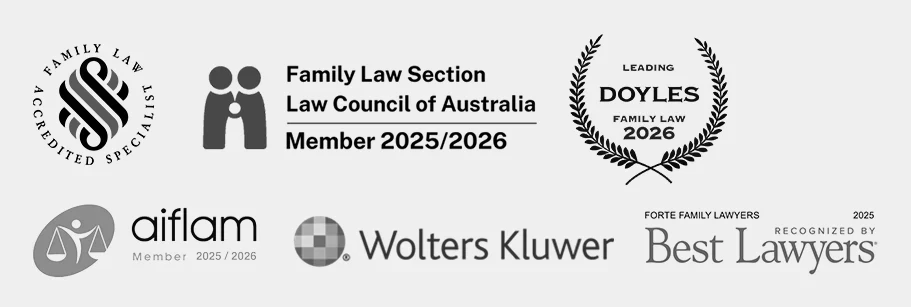Parenting Matters
Providing clear, compassionate legal support in all areas of children’s and parenting matters after relationship breakdown, including care arrangements, complex parenting matters and parenting dispute resolution.


Accredited Family Law Specialists
Entrust Your Parenting Matters To Our Highly Skilled Melbourne Family Law Team
Organising parenting matters during a divorce or separation can be an emotionally challenging experience. Our team will help you to resolve your matter with care, professionalism, and a child-focused approach.
Whether you need assistance organising parenting arrangements after separation, working through parenting disputes, relocation, or international family law matters, our highly experienced team will guide you to reach a fair agreement that reflects the best interests of your child/ren.
Why Work With Us?
Best Interests Arrangements
Rely on a trusted team with a strong track record of achieving practical, child-focused parenting outcomes. We’ve guided countless families through even the most complex parenting matters with professionalism and care.
Confidence & Trust
With our experienced team supporting you, you’ll always receive the most up-to-date legal advice and clear guidance tailored to your circumstances, helping you navigate parenting arrangements with confidence.
Comprehensive Understanding
Our deep understanding of parenting and children’s matters under the Family Law Act ensures you can make informed choices that support your child’s wellbeing and your family’s future.
Book an Appointment
Get started by booking an appointment with one of our team members.
"*" indicates required fields
What areas can we assist with?
Parenting Plans
Helping parents create clear, practical and child-focused parenting plans that outline care arrangements, communication and decision-making responsibilities.
Mediation & Dispute Resolution
Encouraging cooperative resolution through mediation and family dispute resolution services. We help you explore parenting solutions outside of court while safeguarding your legal rights and responsibilities and your child’s wellbeing.
Consent & Parenting Orders
Assisting in the preparation, drafting and filing of legally binding consent orders to formalise agreed parenting arrangements. We guide our clients through the court processes to obtain parenting orders.
Complex Parenting Matters
Expertly managing high-conflict or sensitive parenting disputes involving mental health issues, family violence, relocation, drug and alcohol abuse or other allegations of risk, always with a focus on the child’s best interests.
Child Relocation & Recovery
Providing advice and representation in matters involving proposed moves with children, or recovery of children who have been relocated without the consent of the other parent, ensuring compliance with legal obligations. We deal with relocations within Victoria, within Australia and internationally.
Contravention Orders
Supporting clients in addressing breaches of parenting orders through contravention applications and ensuring accountability while seeking solutions that prioritise children’s welfare and stability.
Family Violence
Providing sensitive and informed legal support for clients experiencing family violence, prioritising safety and urgent protection for children and parents, through intervention orders and suitable parenting arrangements.
International Parenting Arrangements & International Relocation
Our family lawyers are experienced in international divorce & child custody cases, ensuring your child’s best interests are upheld in cross-border parenting arrangements and disputes. We assist with international parenting plans, relocation disputes, relocation applications, custody issues, Hague Convention child abduction matters and child abduction matters with countries not covered by the Hague Child Abduction Convention.
Child Support
Offering advice and legal solutions related to child support assessments, agreements and disputes to ensure fair financial arrangements that support the needs of your children.
Court Representation
Strong, strategic representation in parenting proceedings before the Family Court and Federal Circuit Court, advocating for outcomes that reflect the best interests of the child and your parental rights.
Supporting You Through Parenting Matters With Care & Clarity
At Forte Family Lawyers, we take a compassionate and collaborative approach to parenting matters. We understand how important it is to establish stable and child-focused arrangements, and we work closely with you to ensure your voice is heard and your concerns are addressed.
Our team combines legal expertise with empathy, offering practical guidance tailored to your family’s unique dynamics. Whether you’re navigating parenting plans, resolving disputes or formalising arrangements, we provide clear, confident support every step of the way.

Meet Our Team Of Accredited Family Law Specialists
Our experienced team of accredited family law specialists is dedicated to helping you address all aspects of parenting and children’s matters. With deep expertise in the Family Law Act and a strong focus on achieving outcomes that support your child’s best interests, we provide trusted, strategic guidance every step of the way.
Customer Reviews
Contact Forte Family Lawyers
For clear guidance and strong advocacy in all parenting and children’s matters, speak with our experienced team of Melbourne family lawyers. We’re here to support you in securing practical, child-focused outcomes with care and expertise.
CONTACT
Our professional Family Lawyers in Melbourne are ready to listen.
Level 15
600 Bourke Street
Melbourne 3000 Victoria Australia
PO Box 13172
Law Courts
8010 Victoria Australia
Telephone
+61 3 9248 5800
Email
enquiries@fortefamilylawyers.com.au

"*" indicates required fields
Frequently Asked Questions
Hidden First Field
What is the difference between parenting plans, consent orders and parenting orders?
A parenting plan is a written, voluntary agreement outlining living arrangements and time spent with the other parent. While it’s not generally legally enforceable, the court will consider such agreements if they are in the child’s best interests. These arrangements, previously known as child custody, are now addressed in terms of parental responsibility and time spent with each parent under Australian family law. Consent orders are formal agreements approved by the Federal Circuit and Family Court of Australia, making them legally binding. If parents cannot reach an agreement, the court may issue parenting orders after a hearing.
What happens if an agreement about parenting matters can't be reached?
If parents can’t reach an agreement, they will usually need to attend family dispute resolution with a registered family dispute resolution practitioner. In many cases this is successful and parents can agree on a compromise. If that fails, they may apply to the court by filing an initiating application. The family law courts may then decide the outcome, with a court date set and possibly a final hearing.
What is meant by parental responsibility?
Parental responsibility refers to the duties, powers, and responsibilities parents have in making decisions for their child’s welfare, including health, education, and religion. As of June 2024, the Family Law Act no longer presumes equal shared parental responsibility. Instead, the court assesses each case based on the child’s best interests, especially where concerns such as child abuse or family violence arise.
What is meant by parental decision-making?
Parental decision-making involves making major long-term decisions for a child, such as schooling, medical treatment, and passport issues. When equal shared parental responsibility applies, both parents must consult and make a genuine effort to agree. If this fails, one party may need to seek legal advice or commence court proceedings.
Are court proceedings necessary to formalise parenting arrangements?
No, court is not necessary in the majority of matters. If both parents reach an agreement, they can formalise it through a parenting plan or consent orders. If agreement isn’t possible, court proceedings may be needed, and a court application can be made. It’s wise to obtain legal advice before deciding whether to apply to the court.
How are the best interests of a child determined after their parents divorce or separate?
The paramount consideration is always the best interests of the child. The court considers factors like the child’s relationship with family members, protection from psychological harm or child abuse and practical matters such as living arrangements, schooling and cultural ties. The family law system assesses these factors carefully before the court makes a final decision.
Can consent orders be changed?
Yes, but only in limited circumstances. If both parties agree, they can file new consent orders. If not, one party can apply to the court to vary existing orders, but must demonstrate a significant change in circumstances. This is a high bar. Always seek legal advice before attempting to change parenting arrangements through the legal system.
What happens if one parent doesn't honour a parenting plan or court orders for parenting?
If a parenting plan is not followed, there’s no legal penalty as it’s not enforceable. However, if court orders are breached, the other party may file a contravention application in court. The court for parenting orders may issue penalties or even a recovery order. It’s important to obtain legal advice if you are facing these issues. Court intervention may result in changes being made to parenting arrangements or orders being made to remedy the situation.
What is an Independent Children's Lawyer (ICL)?
An Independent Children’s Lawyer (ICL) is appointed by the family law courts in complex cases to represent the child’s best interests. They do not represent either parent but assist the court in seeking orders that protect the child from risk. They work with family report writers and may obtain evidence from teachers or other professionals, and often working with psychologists and other professionals to ascertain the child’s views, understand the child’s needs and make recommendations which are in the children’s best interests.
How is child support assessed?
Child Support (Services Australia) calculates child support using a standard formula that considers each parent’s income, the amount of time the child spends with each parent, and the child’s age. This is known as an administrative assessment.
However, parents can also enter into private child support agreements, either:
- A limited child support agreement, which must be in writing and based on a Child Support Agency assessment; or
- A binding child support agreement, which can set any amount (even if different from the assessed amount), but requires both parties to obtain independent legal advice.
Agreements offer more flexibility than administrative assessments and can cover extra expenses like school fees or medical costs.
If disputes arise, getting advice from experienced family lawyers is a good first step. You can request a reassessment through Child Support or, in some cases, apply to the court to resolve issues, enforce payments, or address other parenting related matters.
If we share 50/50 custody, why would one parent still have to pay child support?
Because child support isn’t just about time – it’s also about income. If one parent earns more than the other, the system ensures both contribute proportionally to the child’s financial needs. Even with equal care, the higher-income parent may still need to pay child support to maintain fairness in supporting the child’s standard of living. Read more about 50/50 care & child support arrangements.



